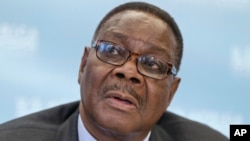Malawi President Peter Mutharika, who took office in May, is considering all options for cracking down on a recent surge in violent crime in the country.
Police have reported several armed robberies, murders and car jackings, creating fear and panic among Malawians.
A week ago, two women were seriously wounded after they were struck by stray bullets during gunfire between a robbery victim and the alleged robbers at Machinjiri Township in Blantyre.
This came a few days a government ambulance was car-jacked in the eastern district of Balaka.
A medical worker was also killed in Lilongwe, the capital, over the weekend.
Deputy national police spokeswoman Mable Nsefula told VOA that in June, police registered 97 criminal cases. That number jumped to 105 in July, Nsefula said.
Increased police patrols
However, after police patrols were increased, she said the number of cases fell to 88 in August.
“The worrisome development is that the cases of murder are the ones that are on the increase,” Nsefula said.
Malawi Police Inspector General Loti Dzonzi told local radio Zodiak Broadcasting Station that although an effort is being made to curb crime, a challenge remains in urban areas.
“There are some areas in the country where we can confidently say things are at appropriate levels. But there are areas of the country where we have challenges, and we need to jack up, more particularly in the urban areas,” Dzonzi said.
He pointed out contributing factors to the rise in criminal activities in the urban areas.
“There is rapid rural-urban migration in this country. The number of the unemployed young people is also very high, with very few opportunities of employment or informal businesses. Our cities are one of the darkest in Africa at night,” Dzonzi said.
'Shoot-to-kill' policy
Some commentators said the crime rates seem to have risen after former President Joyce Banda's administration invalidated a "shoot-to-kill" policy in 2012, which allowed police to gun down suspects caught committing a crime.
The policy was decried by human rights groups who said it violated the rights of suspects and the legal premise of innocent until proven guilty.
Banda's predecessor, the late President Bingu wa Mutharika, introduced the policy in an attempt to lower crime rates, ignoring international condemnation of the policy by donor partners.
But president Banda removed the policy four months after taking power, saying it contradicted Malawi's constitution, which provides basic rights to suspects.
Reacting to the increased concerns about the rise in violence, Mutharika told a public rally in Blantyre over the weekend that his administration is waging war against crime.
He said organized gangs - he did not disclose which ones - want to destabilize his administration.
“Local media have been reporting that crime rate has increased in the country. I know what is behind all this because with me I have intelligence information [about people behind crime activities],” Mutharika said. “So I want to tell you that from now onwards there is a war against crime.”
In that effort, Mutharika said the government is giving police an additional 50 vehicles to increase patrols in and around the country’s main cities and towns.
In the 2014-2015 national budget, currently under review in parliament, the government has more than doubled its allocation to the country’s law enforcement agencies, including local police, to help curb criminal activities.




